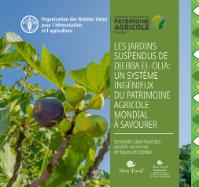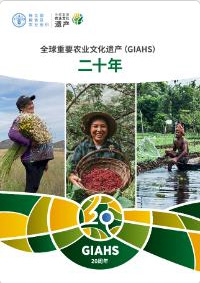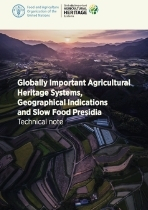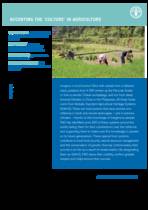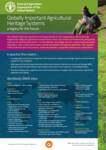As part of the collaboration between the FAO GIAHS Secretariat and the Slow Food Foundation, the ancient varieties of figs in the Hanging Gardens from Djebba El-Olia GIAHS site were included in the Slow Food Presidium catalog with the aim of recognizing the importance and urgency of preserving this agricultural heritage site.
Language: French
巧妙的世界农业遗产系统(GIAHS)是由生活在其领土上关系复杂的社区所居住的农业生态系统。这些不断发展的地点是具有弹性的系统,其特点是具有显著的农业生物多样性、传统知识、宝贵的作物和景观,由农民、牧民、渔民和森林居民可持续地管理,以促进其生计和粮食安全。本出版物收集了不同的GIAHS成功案例,旨在展示联合国粮食及农业组织(粮农组织)GIAHS计划建立以来的20年成就。本出版物介绍了来自坦桑尼亚联合共和国、中国、日本、意大利、西班牙、秘鲁和阿尔及利亚的成功案例,概述了这些系统被指定为GIAHS后的变化。
This report seeks to provide the countries in the Europe and Central Asia region with an overview and real examples of Nature-based Solutions (NbS) applied to agriculture. This is FAO’s first attempt to present NBS applied to agriculture especially pointed at the countries of this region, prompting the scaling-up of these actions as solutions to brought ashore the transition towards resilience and sustainable agriculture.
This technical note highlights the specificities of each approach, clarifies key differences between them and explores possible synergies. It also aims to encourage farmers and governments to contribute to and support the conservation of these fragile and remarkable local food systems, and as such, to the achievement of the Sustainable Development Goals (SDGs). The note focuses on three approaches in particular: Globally Important Agricultural Heritage Systems (GIAHS), Geographical Indications (GI) and Slow Food Presidia.
It has been some 12 000 years since humans gave up their huntergatherer ways. They grasped the idea of saving and planting seeds from season to season, which meant that instead of constantly foraging for food, they could stay in one place. They were able to concentrate on building their communities and, at the same time, develop agricultural systems adapted to local climates that allowed them to survive and even flourish in the lands where they settled. With each generation improving upon the previous, these ingenious systems have brought with them the indigenous knowledge of the centuries.
The Globally Important Agricultural Heritage Systems (GIAHS) programme aims to identify, support and safeguard agricultural systems that sustain and conserve our biodiversity and genetic resources for food and agriculture, rural livelihoods, knowledge systems, cultures and remarkable landscapes. They are the quintessence of what sustainable development should be. FAO, together with its national and local partners, works towards their recognition and dynamic conservation.


